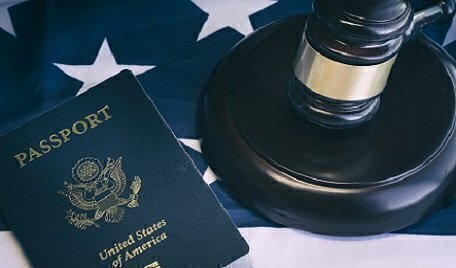For nearly 18 years, Congress has been studying plans to protect hundreds of thousands of young immigrants known as “dreamers” from the risks of being deported to their home countries, but it has yet to complete such legislation. On Friday, the Supreme Court stepped in to settle their legal fate, at least for the next few years.
 The Justices will rule, during their next term, on the legality of the Trump Administration’s plan to end the program called Deferred Action for Childhood Arrivals. If the Administration wins, that could lead to the start of deportation for many.
The Justices will rule, during their next term, on the legality of the Trump Administration’s plan to end the program called Deferred Action for Childhood Arrivals. If the Administration wins, that could lead to the start of deportation for many.
DACA was begun in 2012 by the Obama Administration and now assures some 800,000 younger immigrants that they can remain in the U.S., where most of them have lived since arriving as children. They are considered to be here illegally because they either entered without permission or over-stayed beyond visa protection. Many of them have become fully participating members in their communities, and many have served in the U.S. military.
They do not have full legal status and, unless Congress acts, no chance of becoming U.S. citizens. The House of Representatives did pass, earlier this month, a bill that would protect the youths involved and offer them a path to citizenship. The American Dream and Promise Act is not given much chance of passage by the Senate, because President Trump has threatened a veto if it does pass.
The citizenship option is not something the Court can bestow, but the Justices do have the authority to allow the DACA program to continue so that the dreamers can stay in the U.S. and work and study. They are eligible to stay for renewable two-year periods.
President Trump and his aides have been trying since last September to shut down the program, arguing that a program like DACA could only have come from action by Congress, not by the action of the Executive Branch, using its own powers. The Obama Administration sought to justify its creation of the program by arguing that it was part of the Executive Branch’s power to decide who should be deported.
The Trump plan to end DACA, however, has been blocked by lower federal courts, concluding that the Administration did not use the proper procedures to end it. In an order issued by the Justices on the closing day of their current term, they agreed to hear three separate appeals filed by the Administration.
The Trump team is raising the same two questions in each of those cases: first, do the federal courts have any authority to rule on the decision to end DACA, or, second, if they do, should the courts have upheld the shutdown plan. If the Court were to agree with either point, that would end DACA.
Although DACA has been in effect for six years, its legality has never been judged by the Supreme Court. Three years ago, however, the Justices – splitting 4-to-4 with one vacancy at that time – upheld a lower court ruling that had nullified a planned expansion of DACA that the Obama Administration had attempted in 2014. That ruling, however, did not directly involve or affect the original, unexpanded DACA.
Texas and a coalition of other states then threatened to sue to strike down the original DACA program, and that led the Trump Administration to decide that the program was likely to be struck down as illegal and chose to end it.
The plan, announced in September, was to take effect after six months (this past March), to give Congress a chance to pass legislation to keep the program going. However, the March shutdown date came and went because in the meantime, Congress did not act and lower courts -- reacting to challenges by state governments and others that want DACA to be kept intact -- blocked the plan to end it.
At one point, President Trump told congressional leaders that, if they could agree on a plan to protect the DACA immigrants, he would sign it. He changed his mind, and his aides now say that any new protection of the program would “reward illegal immigration.”
It is a curious facet of the Administration plan that it is using, as the basis of a claimed authority to end the program, the same claim as the Obama Administration used to create it: that is, it was an act of prosecutorial discretion on how to enforce existing federal immigration laws.
The Justices’ review will include a hearing on the combined three appeals, perhaps early in the next year, with a ruling to be made by about a year from now. That will put the DACA controversy in the middle of next year’s presidential campaign, in which the fate of the “dreamers” is expected to be a major political issue for Democrats to press.
Lyle Denniston has been writing about the Supreme Court since 1958. His work has appeared here since mid-2011.







